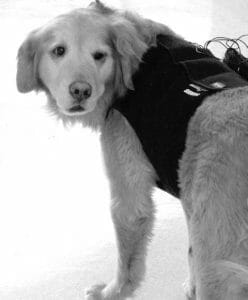The normal pacemaker of the heart lies in the heart’s right upper chamber. This structure, known as the sinus node, normally generates the heart’s electrical impulse. This impulse is then carried through the upper chambers and reaches a structure known as the AV node. Normally, the AV node is the only electrical connection between the upper and lower chambers of the heart, so it conducts the impulse down to the pumping chambers, which then discharge and pump blood to the body.
An arrhythmia is an abnormal heart rhythm in which this normal sequence of events is disrupted. An abnormal heart rhythm may be detected by your veterinarian as they listen to your pet’s heart with a stethoscope (a process known as auscultation). However, often arrhythmias are intermittent, meaning they are not present all of the time. For this reason, a normal heart auscultation does not rule out the presence of an intermittent abnormal heart rhythm.
What are the Possible Signs of Arrhythmia I Might See in My Pet?
Many pets will not show noticeable outward signs of an abnormal heart rhythm unless it is sustained (long lasting). The signs they show may be subtle and falsely attributed to other things, such as a pet aging. Commonly reported signs include sleeping or lying about the house more, weakness, lethargy, collapse or near collapse (stumbling, being wobbly), vomiting, and decreased appetite. These signs may wax and wane as an abnormal heart rhythm comes and goes.
What are the Causes of Arrhythmias in Pets?
There are many causes of abnormal heart rhythms. Underlying structural heart disease is often present, but not in all patients. In some patients, the structural heart disease is actually the result of the abnormal heart rhythm, rather than vice versa. It is important to determine this, as the prognosis can be significantly different for these two different scenarios. In other patients, problems outside of the heart itself are the cause of an abnormal heart rhythm. For example, certain diseases of the spleen or brain, malpositioning of the stomach, and very low red blood cell counts (severe anemia) are all potential causes for arrhythmias.
What Can be Done to Determine the Cause of My Pet’s Arrhythmia?
Several diagnostic tests are used to determine the cause of your animal’s abnormal heart rhythm. The first is an electrocardiogram (ECG, EKG) that noninvasively records the heart’s electrical activity and displays the waveforms on a computer. This test allows the veterinarian to determine the type of abnormal heart rhythm present, which will then help narrow the list of potential underlying causes. The next step is to determine if structural heart disease is present. The gold standard for determining this is a complete echocardiogram performed by a board-certified veterinary cardiologist. The echocardiogram is an ultrasound of the heart that allows the cardiologist to examine the two-dimensional structure, pumping and relaxation function of the heart, and blood flow through the heart valves and great vessels. This is a completely non-invasive procedure, without pain, and completed without sedation in almost all patients.
Other diagnostic tests that may be indicated on a patient-by-patient basis include chest radiographs (X-ray), blood pressure measurement, blood tests, and a Holter monitor. A Holter is a 24-hour ECG recording device that a pet wears at home so that heart rhythm can be assessed during their normal activity. This can be helpful in determining the frequency and severity of an abnormal heart rhythm that appeared infrequently on a baseline ECG.

Dog wearing a Holter monitor.
What Treatment Options are Available for Animals with Abnormal Heart Rhythms?
The treatment course depends on the type and severity of abnormal heart rhythm present. Mild rhythm disturbances usually do not require treatment. More severe, rapid rhythm disturbances can be treated with either medications or, in some cases, curative catheter-based procedures. More severe, slow heart rhythms can be treated with pacemaker implantation. It is important to also treat any concurrent, significant structural heart disease or diseases outside of the heart that may be contributing to the abnormal heart rhythm.
All treatment options will be discussed in detail with you, so that you are comfortable with your pet’s care. You form a vital part of the team that strives to optimize your pet’s quality and length of life.
Our Cardiology Specialists Work with Your Family Veterinarian
A Board-Certified Veterinary Cardiologist has four years of specialized training beyond veterinary school and has passed a series of exams to achieve board certification.
Our veterinary cardiologists work carefully with your family veterinarian for the best care of your dog. We form a team, along with you the owner, to best care for your pet. Much of the follow-up testing can be performed at your family veterinarian’s office, with periodic follow-up with your pet’s veterinary cardiologist. Our goal is to prevent or delay significant complications in pets with arrhythmias and avoid stressful and more expensive emergency room visits.